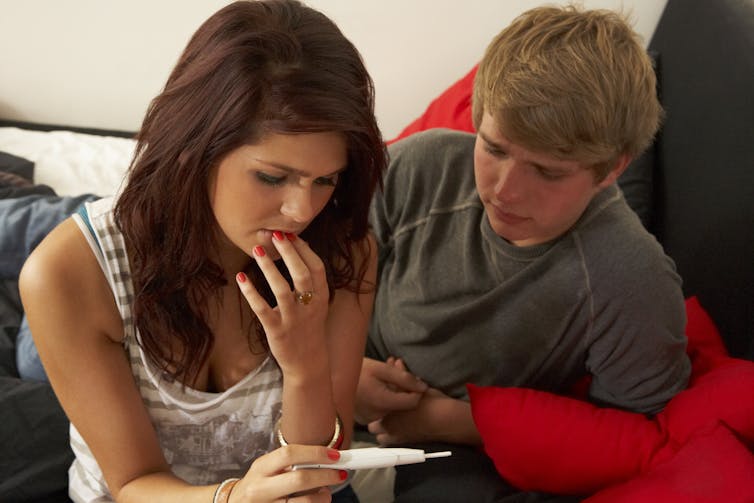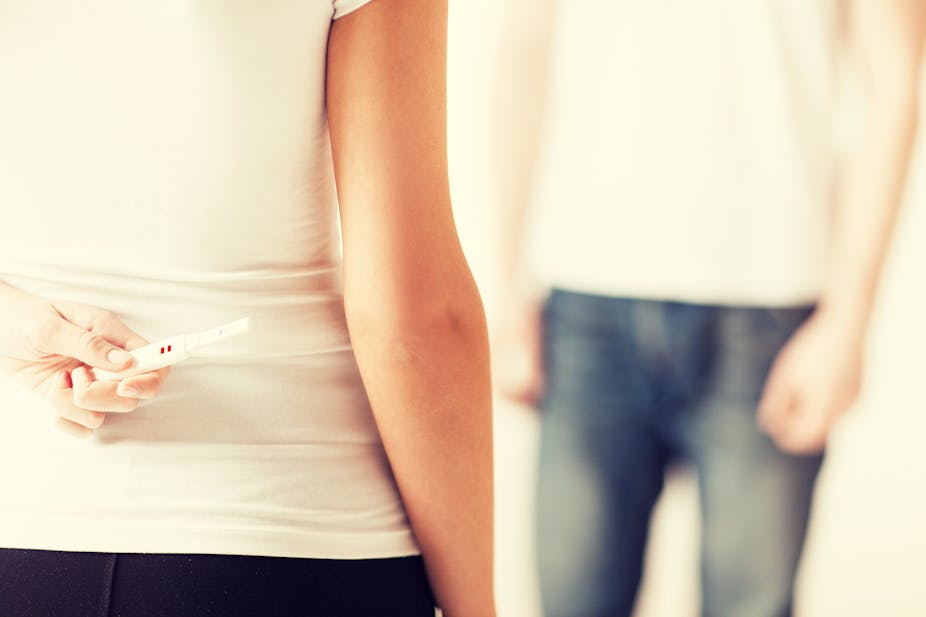Teenage births are declining across much of the developed world. For example, the latest statistics show teenage births in Northern Ireland, as in the rest of the UK, are experiencing a steady downward trend: from 1,791 in 1999 to 839 in 2014.
However, these figures only tell us about teenage births not teenage pregnancies. We don’t know how many teenagers in Northern Ireland have abortions. Retrictions mean most women who wish to terminate a pregnancy travel to other parts of the UK or Europe to do so or obtain “abortion pills” over the internet, leaving an incomplete picture of teenage pregnancies.
We do know that the rest of the UK still has one of the highest rates of teenage pregnancy in Europe, despite recent falls. Just under 25,000 women under the age of 18 became pregnant in England and Wales in 2013 and approximately half of these opted for legal abortion. So it is likely that the rate of teenage pregnancy in Northern Ireland is quite a lot higher than the rate of teenage births.
However, the latest figures on births also tell us little about the fathers. Teenage pregnancy is often considered to be a woman’s problem, or a problem for women and children – or even society more broadly – but teenage men are rarely part of this picture.
Counting the costs
Of course, not all teenage pregnancies are unintended or unwanted. They can be a welcome and fulfilling aspect of many teenage women’s lives. Yet, when we do count the negatives, we only count these in terms of the adverse medical, educational and economic outcomes for teenage mothers and their children.
Also, when we count the costs, it is always in terms of the costs of “teenage mothers” to the exchequer. For example, we know that every year in England approximately £26m is paid in benefits to teenage mothers on income support. The Northern Ireland government has pinned the cost to the economy of each teenage mum at £20,000 a year based on income support plus tax revenue foregone with an approximate annual cost to the Exchequer of £25m.

But most births to teenage women are also births to teenage men. Teenage boys have a vital but neglected role in preventing unintended pregnancy and standing up to the responsibility of dealing with a teenage birth. Research shows children with fathers who are involved in their lives do better in education, are happier (have higher self-esteem and life satisfaction) and have better relationships with childhood friends as well as relationships in adulthood. The children of involved fathers are also less likely to show problem behaviours such as delinquency and other criminal behaviours.
But to help men plan for parenthood in their lives we need to start educating young men at an earlier age. Boys are less likely to receive relationship and sexuality education in schools in general and especially in relation to teenage pregnancy. The lack of resources for teaching boys about teenage pregnancy has prompted the World Health Organisation among others to call for action. And research shows that parents are much less likely to talk to their sons than their daughters about avoiding a teenage pregnancy.
The rates of teenage births are also thought to be much greater for boys and young men who might be most in need of support. Approximately one in four young men in young offenders’ institutes are thought to be or about to become fathers.
Part of the solution
It’s time to engage teenage men not just as part of the problem of unintended pregnancy in teenagers’ lives but as part of the solution. To do this, we should ensure that teenage fathers are always registered as fathers at the birth of their children. We can also provide boys with better relationship and sexuality education, which includes them in the reproductive equation and educates them that as they become sexually active they also become reproductively active too.
Recognising this need, my colleagues and I are studying the effectiveness of a new educational resource entitled “If I were Jack…”. This is designed to help young boys aged 14 to 16 years as well as girls imagine the consequences of an unintended pregnancy and to develop the skills to avoid one.
Teenage pregnancy and teenage births are not all about the girl – and forgetting that comes with costs both for our society and for thousands of children. It’s time to share the responsibility with young men, from pregnancy to birth to fatherhood.

